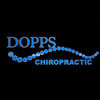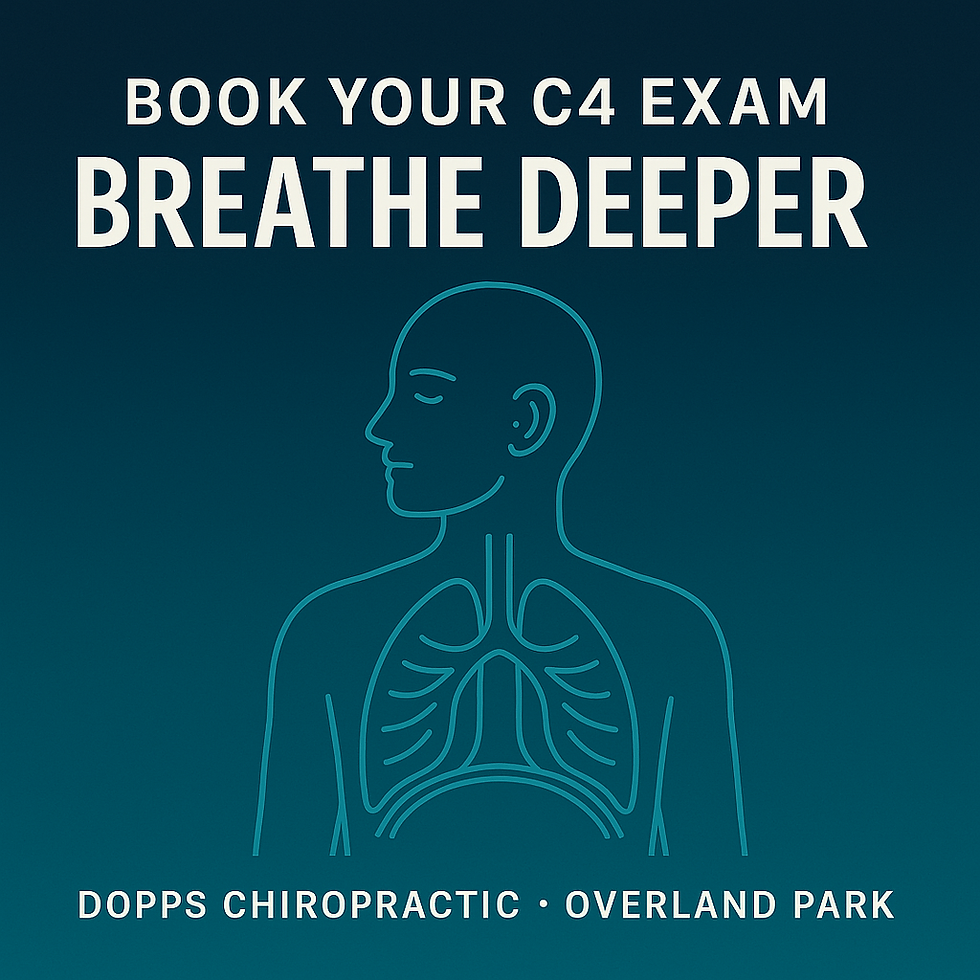C4 (Cervical 4) — The Diaphragm Driver: How Chiropractic Care in Overland Park Helps You Breathe Deeply and Calmly
- Dr. Rory Dopps

- Jul 10, 2025
- 5 min read
Updated: Aug 11, 2025

Every breath you take is powered by your diaphragm — but what powers your diaphragm? Few people realize this crucial muscle depends on clear, uninterrupted signals traveling through the phrenic nerve, which originates around your C3–C5 vertebrae, with C4 being the primary driver.
When your C4 vertebra shifts even slightly out of place, it can compress or irritate this vital nerve root. The result? Shallow breathing, constant sighing, tight shoulders, and even anxiety spikes you can’t quite explain. At Dopps Chiropractic care in Overland Park, we teach our patients that shallow breathing is often more than a bad habit — it’s a sign that your spine and nervous system are asking for help.
When your diaphragm can’t move freely because of nerve interference at C4, your whole body feels it. You may find yourself short of breath, unable to take a full, satisfying inhale. Many people assume they just have “in bad lungs” or “bad posture” — but often, the real problem is a stuck C4. Gentle chiropractic adjustments restore motion, relieve pressure on the phrenic nerve, and help your body return to its natural breathing rhythm — calmly, deeply, and fully.
Learn More About Breathing and Stress on the Wellness Waves Podcast
Did you know that better breathing can help reduce blood pressure, balance hormones, and improve sleep? Dr. Dopps breaks down this fascinating link in real patient stories on our Wellness Waves podcast. In these conversations, you’ll hear how Overland Park patients found relief from shallow breathing, anxiety, poor sleep, and even digestive issues — all by correcting hidden nerve stress at the C4 vertebra. Search “Wellness Waves” on your favorite podcast app and breathe in the knowledge you need to take control of your health naturally.
What Does the C4 Vertebra Actually Do?

Your C4 spinal nerve root is responsible for:
Diaphragm Control: The phrenic nerve, primarily fed by C4, tells the diaphragm when and how to contract. Without clear signals, your body switches from calm, deep belly breathing to shallow, stressful chest breathing.
Rib Cage Expansion: C4 indirectly supports rib movement by stabilizing neck and upper shoulder muscles that anchor the top of the rib cage. Misalignment can tighten these muscles and lock the ribs.
Neck and Shoulder Coordination: C4 nerve pathways help muscles like the scalenes and trapezius stabilize your upper body during breathing, posture, and stress response.
Autonomic Nervous System Balance: When your phrenic nerve is stressed, your body stays stuck in “fight or flight” mode. Proper alignment brings your body back into a calm, “rest and digest” state.
How Do You Know If C4 Is Out of Place?

Common signs of a C4 subluxation include:
Shallow, quick breathing that feels incomplete
Constant sighing, yawning, or feeling like you can’t catch your breath
Tight or tender spots in the neck and tops of the shoulders
Chest tightness that comes and goes, especially when stressed
Anxiety that seems worse when you can’t take a full breath
Frequent throat clearing or feeling a “lump” in your throat
Trouble sleeping deeply, often waking up feeling like you didn’t get enough air
These symptoms often overlap with stress or mild asthma — but the hidden factor may be your spine.
Who Is Most Likely to Have a Stuck C4?

Some life stages and habits make C4 misalignments more common:
Asthma or Allergies: Chronic shallow breathing can overwork the diaphragm and tighten the neck muscles that stabilize it.
Musicians and Singers: Wind instrument players and vocalists use huge breath support, which can strain the phrenic nerve if posture is poor.
Office Workers: Slouching forward collapses the rib cage and strains the neck daily.
Students with Heavy Backpacks: Carrying weight unevenly can jam the cervical spine, especially at C4.
Moms and Dads Carrying Kids: Constant lifting with the head forward can torque the neck and shoulders.
Whiplash or Sports Collisions: Any impact that snaps the head forward or backward can damage C4’s soft tissues.
Daily Habits That Misalign the C4 Vertebra

Modern life isn’t kind to your cervical spine. These daily stressors add up over time:
Sitting or driving hunched over, compressing the chest
Sleeping with multiple pillows pushing the head too far forward
Carrying bags on one shoulder, twisting the neck
Holding stress in the shoulders and jaw — clenching during work or workouts
Working at a computer with the head jutting forward
Small movements repeated daily can gradually cause big problems.
What Happens If You Ignore C4 Misalignment?

Without correction, C4 subluxations follow a predictable path:
Phase I (0–5 Years): Early signs like neck stiffness, frequent sighing, and tension headaches.
Phase II (5–15 Years): The spinal joints begin to degenerate. Rib mobility drops, shoulders stiffen, and breathing stays shallow even at rest.
Phase III (15+ Years): Degeneration may lead to partial fusion or severe arthritis at C4–C5, permanently compromising phrenic nerve flow.
The earlier you find and correct a C4 problem, the more fully you can reverse or prevent damage.
Hidden Hormonal Connections: The DUTCH Test

If your stress levels and breathing are connected, you may have deeper adrenal or hormone imbalances. That’s why we often recommend the DUTCH Complete Test, which maps:
Daily cortisol levels, showing if your stress hormones are keeping you in shallow, chesty breathing patterns.
Melatonin production, which can reveal why your sleep isn’t repairing your nervous system.
Sex hormone ratios, which affect inflammation and muscle tone.
The DUTCH Test is simple — you complete it at home, mail it in, and once your results are ready, Dr. Dopps reviews everything with you by phone or video consult, no matter where you live. It’s a powerful tool for getting to the bottom of stress and breathing issues.
Nutritional Support for C4 and Diaphragm Health

Your spine can’t heal on adjustments alone — your body also needs the right building blocks. That’s why our C4 patients often benefit from this targeted Designs for Health protocol:
NeuroMag™ — Magnesium L-threonate that crosses the blood-brain barrier to relax neck and shoulder tension, improve nerve transmission, and help you sleep deeply so your diaphragm resets overnight.
HistaEze™ — Supports a healthy histamine response for patients with allergy-related shallow breathing or throat tightness. Helps open airways naturally.
Adrenotone™ — A gentle adaptogen complex that calms your stress axis so you stay out of fight-or-flight mode. When your body is calm, your breath follows.
All of these practitioner-grade supplements can be ordered through our secure online store and shipped directly to your door.
Ready to Breathe Deeper Chiropractic Care in Overland Park?

You don’t have to live with tight breathing, chest tension, or chronic sighing. Your diaphragm is designed to work effortlessly — all it needs is clear nerve supply and healthy alignment. Let’s make that happen together.
Book your C4 exam today at Dopps Chiropractic in Overland Park and see how powerful one small adjustment can be.





Comments